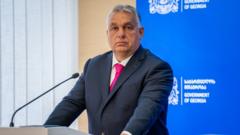Hungarian Prime Minister Viktor Orban stirred controversy during his recent visit to Georgia by defending the contentious results of the country's election held just days prior. He applauded the electoral process as "free and democratic," conveniently overlooking significant allegations of misconduct and vote discrepancies. The EU election observers reported serious irregularities, maintaining that the elections could not be classified as fair, bringing attention to a landscape rife with escalating tensions between governmental authority and democratic norms.
Orban's remarks came alongside a series of events in which Georgia's pro-Western President Salome Zourabichvili rejected the election results, stating they were the product of a "Russian special operation" aimed at undermining the country's political independence. Prior to discussing the election with Georgian Prime Minister Irakli Kobakhidze, Orban noted the discrepancy between how elections are portrayed in Europe: "If liberals win, they are democratic; if conservatives win, it is disputed," he proclaimed defiantly.
Despite Orban's assertions, both the US and EU have condemned the conduct of the election, calling for an impartial investigation into reported incidents of violence, intimidation, and violations during the voting process. Opposition parties contended that the elections were stolen, suggesting that the ruling Georgian Dream party is steering the nation back into Moscow’s sphere of influence. European Commission President Ursula von der Leyen emphasized that Georgians deserve an immediate and transparent investigation into the alleged electoral irregularities.
On the election evening, independent monitoring body "My Vote," which deployed 1,500 observers, documented numerous violations including vote-buying, ballot-stuffing, and tactics that allowed individuals to vote multiple times. President Zourabichvili has urged mass protests against what she labeled a "rigged" electoral process, coinciding with thousands of Georgians demonstrating their dissatisfaction with the election results.
Furthermore, the Georgian election commission faced criticism for its alleged ties to the ruling party, as observers reported that key mechanisms meant to prevent electoral fraud were inadequately enforced. In response to these claims, the election commission dismissed the allegations as part of a "manipulative campaign" and promised to recount votes from select polling stations.
While the Georgian government maintains that the elections adhered to legal standards, watchdog organizations express grave concerns over the integrity of the electoral process and the consolidation of power, describing the situation as a worrying trend toward authoritarian governance.



















